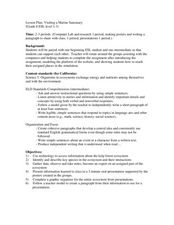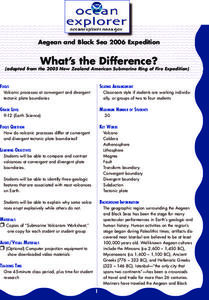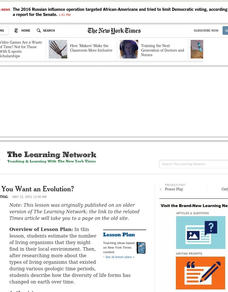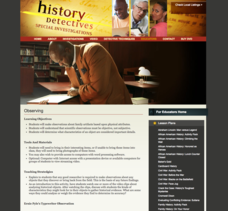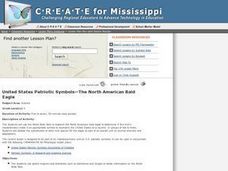Curated OER
How Quickly Disease Spreads
Students demonstrate how quickly disease spreads and the importance of protective measures with communicable diseases. They examine past epidemics such as the Bubonic Plague and make predictions about future epidemics.They compare and...
Curated OER
Industrial Revolution in America: Exploring the Effects of the Heat Engine on the Growth of Cities
Eighth graders examine the reasons for the growth of cities in North American. Using the internet, they research the causes and effects of the Industrial Revolution and determine if the growth of cities is a sign of progress. They...
Curated OER
Asexual versus Sexual Reproduction
Students explore reproduction. They research organisms and groups of organisms to determine whether they reproduce sexually or asexually. In addition, they determine the organism's habitat.
Curated OER
Beauty: Patterns in Nature
Students explore the patterns of nature. In this interdisciplinary instructional activity, students examine beauty in nature and participate in a hands-on simulation that demonstrates how human preferences for beauty have led to an...
Curated OER
Reach for the Stars
Students investigate the Underground Railroad. In this slavery instructional activity, students read books about slavery, the Undeground Railroad, and how slaves escaped the south. Students develop knowledge about coded songs and...
Curated OER
Visiting a Marine Sanctuary
Learners gather information on a kelp forest and identify species in that ecosystem. In this underwater ecosystem instructional activity students gather data, give an oral presentation and create a poster.
Curated OER
Earth: The Food We Eat, The Seeds We Sow
High schoolers explore the importance of seed diversity for cultural and ecological stability/health. They discover what an heirloom seed is and why they are important to conserve.
Curated OER
What's the Difference?
High schoolers investigate volcanic processes at convergent and divergent
tectonic plate boundaries. They read and analyze diagrams, complete a worksheet, and write an essay.
Curated OER
Biogeochemical Cycles
Middle schoolers demonstrate comprehension of the energy sources of various cycles by completing mini stories. They demonstrate analysis of words by defining individual word parts and combining them to form definitions. Students...
Curated OER
Gravity Gets You Down
Students investigate the force of gravity and how it effects different objects that are put into acceleration when applied the experiment of free falling. They drop different objects that have a variety of masses and some that cause air...
Curated OER
Analog Forecasting
Students recognize the elements of an analog weather forecast. In this weather forecasting instructional activity, students use a website and look for trends, persistence and climatology in weather forecasting. Students complete a...
Curated OER
Elders' Weather Forecasting
Students interview an Elder to determine ways of forecasting the weather. For this weather lesson, students use the information from an interview to make a weather prediction.
Curated OER
How Do You Know A Panther Was Here?
Students research the signs that panthers leave. In this panther track activity, students conduct Internet research into the signs that panthers leave such as tracks, scat, scrapes, and scratches. They make a three-dimensional poster...
Curated OER
What Makes a Cat a Cat?
Learners investigate the lives of pets by videotaping them. In this animal life lesson, students videotape a cat and other pets using school cameras in a computer lab. Learners review the footage from the cat and other animals and...
Curated OER
Electromagnetic Bomb (E-Bomb)
Students explain how E-bomb works. In this physics lesson, students simulate the effects of e-bombs on electronic targets. They discuss its potential harmful effects when used as a weapon.
Curated OER
Doctors as Detectives
Students consider the investigative and detective work that goes into disease control. They research specific diseases and simulate a doctor-patient diagnosis situation.
Curated OER
Know Bones About It!
Students make a model of a major skeletal muscle group. They consider how their life might change if they didn't have, or lack use of, this particular muscle group.
Curated OER
You Say You Want an Evolution?
Learners estimate the number of living organisms they might find in their local environment. After researching the types of organisms that existed during various geologic time periods, students describe how life forms have changed over...
Curated OER
Getting Fired Up
Students explore first-person accounts of volcanic eruptions throughout time and use second-hand information about volcanoes. They use both types of accounts to write news articles covering the events of a historic volcanic eruption as...
Curated OER
The Earth Day Groceries Project
Students research Earth Day and make bags to hand out on Earth Day to help promote taking care of the environment.
PBS
Observation
Students study making scientific observations . They conduct a "field study" in their attic and make observations about their family artifacts based upon physical attributes. In addition, they determine what characteristics of an object...
Curated OER
The Physics of Cell Phones
Students explain how cell phones work. In this physics activity, students describe the advantages and advantages of having one. They identify the different parts of a cell phone.
Curated OER
Fire Escape
Learners explore the effects of the volcanic eruption of Nyiragongo in Congo as a springboard to exploring past examples of volcanic eruptions and their respective relief efforts.
Curated OER
US Patriotic Symbols: The North American Bald Eagle
Students research the North American bald eagle to determine if this bird's characteristics make it an appropriate symbol to represent the United States as a country. They debate the substitution of other bird species for the eagle.







